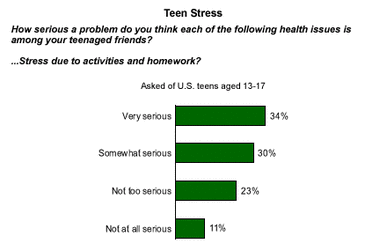Students well-being can’t be ‘stressed’ enough
November 15, 2018
As students make the transition from middle to high school, many are unable to deal with the stress and expectations that accompany the change. Tests, essays, and homework assignments consume teens’ afternoons, as the weekends themselves become less of a break and more of a grind. Many students in grades 9-12 understand what it’s like to meet deadlines, pull “all-nighters”, and manage jobs outside of school.
Last-minute homework assignments and crammed study sessions are the norm for students and contribute to exponentially higher stress levels. Every student knows how easy it is to leave assignments until the last minute, and finish a worksheet in power block, but maybe it’s due to the fact that students have no time for the small things because the big things become overbearing and time-consuming.
You may be wondering what a “big thing” would be, and that answer is simple. It varies student to student. An essay might frighten one student, whereas words and literature come easily to another. A chemistry test may discourage an individual, only because all she can imagine is the letter grade in her head. Many students have similar causes of stress. As my time spent in the High School had brought me to realize the types of stress I encounter, as I’ve compiled 11. Despite the significance of all types, some lie more important than others. In no particular order, they are as followed: upcoming tests, too much homework, a heavy workload, lack of organization, too little “down time”, poor sleep schedule, participating in class, lack of support, transitioning to a new environment, difficulty in classes, and change in routine. Any student may be able to pick a few that contribute to their level of stress, as each cause is not more important than another.
What is stress? The idea of “stress” and its impact on all individuals has always been present in all decades, but students now are forgetting what the word itself means. It is defined as a state of mental or emotional strain or tension resulting from adverse or very demanding circumstances. Nowadays students are interchanging the word “stress” to simply mean “busy”. When interviewing Mr. Menegoni, the vice principal of the Hamilton-Wenham Regional High School, about his personal experience with overstressed students, he stated, “Kids say they are stressed out, and when I was in school we said we were busy.”
As extracurriculars, sports, and activities remain in all student’s lives, many forget what being busy actually does to an involved student. Also, many uninvolved students feel stressed, only showing that as you add more into your life such as sports, hobbies, or jobs, the more stressed you will feel. Mr. Menegoni showed interest in the idea of student stress and how it affects the school as a whole, stating, “All students need a work box, and that box is an area where they put all their mental work away. Without it, students become overwhelmed and unable to deal with school work and commitments.”
Many students do not know how to cope with stress. As there is simply a limited time where a student can take time and think about what causes this overbearing feeling, so many put that option in the back of their mind. Students deal with two types of stress: external triggers, like transitioning to college or your parents getting a divorce, and internal triggers, like placing high expectations on yourself, according to Stephanie Salazar, Outreach & Education Program Manager at the University of Michigan.
These two specific types provide the basis for student stress. Luckily there are ways to acknowledge and cope with, it. Stress can cause harmful effects on emotional and physical health, as well as limit students ability to function at home and in school.
Stephanie Salazar, Outreach & Education Program Manager at the University of Michigan implements that students should avoid procrastination. She underlines the idea that many students have trouble staying on task, and becoming unaware of that, places a strain on students mental health.
As sleep is not the first priority on students’ minds, Salazar states that “Physical activity can help you burn off the energy generated by stress” but many students lack the time to involve themselves in physical activity, unless involved in school-related sports.
Drinking coffee has become a routine for many students in grades 9-12. Although caffeine increases students ability to “wake up”, it may be better to eliminate stimulants such as these, as caffeine is known to elevate the stress response within the body.
Salazar encourages students to pace themselves throughout the day, emphasizing the importance of “taking regular breaks from work or other structured activities.”
Salazar’s advises students to be aware of their capabilities. She stated, “Realize that you have limits. Learn to work within your limits and set realistic expectations for yourself and others.”
Do high school students realize that they have limits? Many students tend to overpack their days with sports and schoolwork, causing them to forget that they have physical limits. By creating a mental vision of how much stress you may have, students are able to visually realize how much is on their plate.
Many believe that it’s strictly schoolwork that causes student stress, but students hold the ability to decide how much out of school work they take on. Students should ask themselves the question “Should I?” before taking on something new. By setting goals to relieve unneeded stress, students are able to create a balanced plate of school, work, and relax time.
According to Salazer, ”mindfulness” helps students understand their thoughts and guide their feelings into realizing what causes stress. Mr. Menegoni, poses the question, of “What do grades mean?”He explains his view by stating, “You don’t start getting grades till middle school, and I think that once that happens, the focus shifts away from learning, and shifts more to getting A’s” As students think of grades at the sole purpose of school, students tend to study in order to do well on a test, opposed to actually wanting to learn.
Because students’ mindset is focused on doing well, many are forced to study for all subjects each night, in hopes that they will do well on quizzes, essays, and tests. Mr. Menegoni compares this to running a race:
Students believe that grades themselves, mark their intelligence, as many students believe that they are ”stupid” just because they do poorly on a few things. Grades cause students to look down on themselves, even though they remain capable of doing well, causing anxiety
Student competition also plays a role in student stress. To stay on their toes, they constantly check their aspen account for grade updates. Students had many viewpoints and opinions on the topic of stress.
Olivia Patt, a junior at HWRHS, takes one AP and mostly honors classes. She believes that no matter the time, her schoolwork is always in the back of her mind. When asking her about her daily level of stress and how she compares it to her peers, she added, “I think the stress has to do with your own self, and everyone’s abilities are different. One student may be taking all AP’s and another all CP’s, but they are both students and it depends on how you handle your stress.” She believes that in high school, students become more focused on the future. As a result, doing all this schoolwork becomes a norm, leading to unhealthy routines that students are building.
As students worldwide experience the feeling of ”stress” and its effect on students daily life, many begin to learn that this feeling is normal and that all teens feel it. But it’s not a norm that should be accepted and allowed within a school climate. Each day a new teen suffers from the feeling of stress and remains uneducated about the lasting effects it can create. Do you personally struggle with stress daily? Does it stray from schoolwork, and into other commitments? If so, visit the link attached to this article and take an anonymous stress test. It may help you understand where your stress is coming from and may help you understand how to deal with it.
https://www.bemindfulonline.com/test-your-stress/

